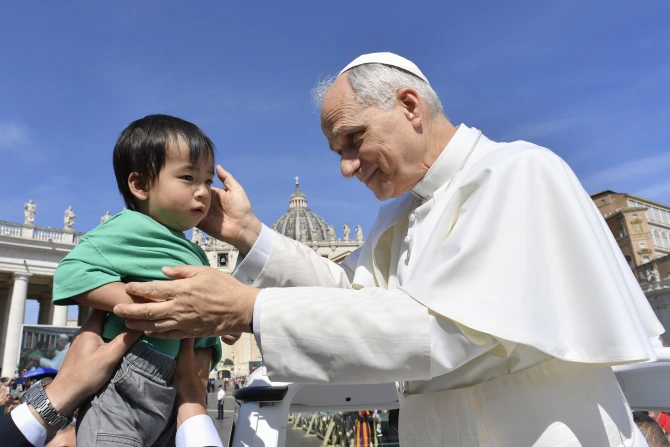
Pope Leo XIV held the third general audience of his pontificate on Wednesday, telling the faithful that even when we feel useless and inadequate, “the Lord reminds us that our life is worthy.”
FIND THE POPE'S BIOGRAPHY HERE
“Even when it seems we are able to do little in life, it is always worthwhile. There is always the possibility to find meaning, because God loves our life,” Leo said in a sunny St. Peter’s Square on June 4, four days before the one-month mark of his pontificate.

In his catechesis, the pope reflected on the parable of the vineyard workers, which is recounted in the Gospel of Matthew 20:1-16. Leo affirmed that, like the owner of the vineyard, Jesus “does not establish rankings, he gives all of himself to those who open their hearts to him.”
This parable “is a story that fosters our hope,” the pontiff said. “Indeed, at times we have the impression that we cannot find meaning for our lives: We feel useless, inadequate, just like the laborers who wait in the marketplace, waiting for someone to hire them to work.”
Just like the laborers waiting in the market for work, the pope argued, sometimes we are waiting a long time to be acknowledged or appreciated, and we may end up “selling ourselves to the first bidder” in the marketplace, where affection and dignity are bought and sold in an attempt to make a profit.

“God never gives up on us; he is always ready to accept us and give meaning and hope to our lives, however hopeless our situation may seem and however insignificant our merits may appear,” the pope said in his English-language summary of the lesson, which he read himself.
The tireless landowner in the parable goes out over and over again to seek laborers for his fields, even late into the day, when the remaining workers had probably given up all hope, Leo said. “That day had come to nothing. Nevertheless, someone still believed in them.”
The behavior of the owner of the vineyard is also unusual in other ways, he noted, including that he “comes out in person in search of his laborers. Evidently, he wants to establish a personal relationship with them.”
Then, “for the owner of the vineyard, that is, for God, it is just that each person has what he needs to live. He called the laborers personally, he knows their dignity, and on the basis of this, he wants to pay them, and he gives all of them one denarius,” even those who only worked the last hour of the day, Pope Leo emphasized.

According to the pontiff, the laborers who had spent all day working were disappointed, because “they cannot see the beauty of the gesture of the landowner, who was not unjust but simply generous; who looked not only at merit but also at need.”
Leo warned Christians against the temptation to think they can delay their work in the vineyard because their pay will be the same either way.
He quoted St. Augustine, who said in his Sermon 87: “Why dost thou put off him that calleth thee, certain as thou art of the reward, but uncertain of the day? Take heed then lest peradventure what he is to give thee by promise, thou take from thyself by delay.”

“Do not wait, but respond enthusiastically to the Lord who calls us to work in his vineyard,” the pontiff said, appealing especially to young people. “Do not delay, roll up your sleeves, because the Lord is generous and you will not be disappointed! Working in his vineyard, you will find an answer to that profound question you carry within you: What is the meaning of my life?”
“Let us not be discouraged,” Leo added. “Even in the dark moments of life, when time passes without giving us the answers we seek, let us ask the Lord who will come out again and find us where we are waiting for him. He is generous, and he will come soon!”
SIGN UP FOR OUR NEWSLETTER HERE
This story was first published by ACI Prensa, CNA’s Spanish-language news partner. It has been translated and adapted by CNA. Hannah Brockhaus contributed to this report.

As a journalist, Victoria Cardiel has specialized in social and religious news. Since 2013, she has covered the Vatican for various media outlets, including Europa Press and Alfa and Omega, the weekly newspaper of the Archdiocese of Madrid.







